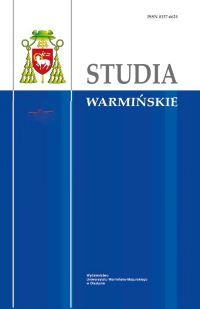Żuławianie malborscy wobec parafialnego systemu fiskalnego w XIX w.
The Malbork Żuławy Population and the Parish Fiscal System in the 19th Century
Author(s): Wojciech ZawadzkiSubject(s): Christian Theology and Religion, Economic history, Social history, 19th Century, History of Religion
Published by: Wydawnictwo Uniwersytetu Warmińsko-Mazurskiego w Olsztynie
Keywords: West Prussia; Żuławy Malborskie; catholic parishes; evangelical parishes; Mennonites;
Summary/Abstract: The system of financing parishes and parsons in the Żuławy region originated in the Middle Ages and with some modifications survived until 1945. This financing system was based on arable land given by the Teutonic Order to each newly canonically erected parish. Upon the arrival of Lutherans and Mennonites in the 16th century to the Malbork region of Żuławy, their churches were built in local Catholic parishes and functioned outside the legal and political system then existing in the Polish Republic. Throughout the modern period, the Lutheran and Mennonite church system had no arable land in the Żuławy region and therefore faced financial problems. In the 19th century, now under Prussian reign, things did not change much in this respect, as Lutheran parishes still did not have a stable economic status and Catholic parishes fully enjoyed the vested rights respected by the Prussian state. For this reason, there were numerous conflicts between the two religious denominations from the end of the 18th century to the beginning of the 20th century that often ended up in court. However, the Mennonites from Żuławy region were in the most difficult legal position, who, in the situation of legal discrimination of their religion by Prussian legislation, more and more often chose to emigrate from Prussia.
Journal: Studia Warmińskie
- Issue Year: 60/2023
- Issue No: 60
- Page Range: 401-415
- Page Count: 15
- Language: Polish

